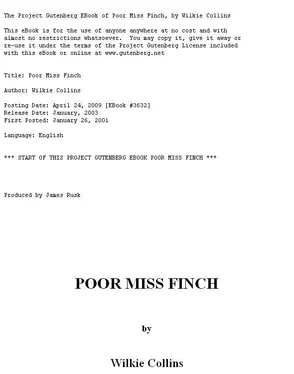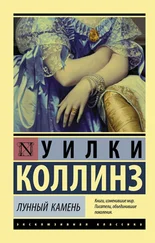Уилки Коллинз - Poor Miss Finch
Здесь есть возможность читать онлайн «Уилки Коллинз - Poor Miss Finch» весь текст электронной книги совершенно бесплатно (целиком полную версию без сокращений). В некоторых случаях можно слушать аудио, скачать через торрент в формате fb2 и присутствует краткое содержание. Год выпуска: 2002, Жанр: Классическая проза, на английском языке. Описание произведения, (предисловие) а так же отзывы посетителей доступны на портале библиотеки ЛибКат.
- Название:Poor Miss Finch
- Автор:
- Жанр:
- Год:2002
- ISBN:нет данных
- Рейтинг книги:3 / 5. Голосов: 1
-
Избранное:Добавить в избранное
- Отзывы:
-
Ваша оценка:
- 60
- 1
- 2
- 3
- 4
- 5
Poor Miss Finch: краткое содержание, описание и аннотация
Предлагаем к чтению аннотацию, описание, краткое содержание или предисловие (зависит от того, что написал сам автор книги «Poor Miss Finch»). Если вы не нашли необходимую информацию о книге — напишите в комментариях, мы постараемся отыскать её.
Poor Miss Finch — читать онлайн бесплатно полную книгу (весь текст) целиком
Ниже представлен текст книги, разбитый по страницам. Система сохранения места последней прочитанной страницы, позволяет с удобством читать онлайн бесплатно книгу «Poor Miss Finch», без необходимости каждый раз заново искать на чём Вы остановились. Поставьте закладку, и сможете в любой момент перейти на страницу, на которой закончили чтение.
Интервал:
Закладка:
"I presume you mean in church?" said the young clergyman.
"In church, of course." (To that extent I believed I might answer for Lucilla, without any fear of making a mistake.)
"They may be married by License," said the clergyman—"provided one of them continues to reside in that other place to which they traveled on the fifth—on the twenty-first, or (possibly) even the twentieth of this month."
"Not before?"
"Certainly not before."
It was then the night of the seventeenth. I gave my companion's hand a little squeeze in the dark. Here was a glimpse of encouragement to cheer us on the journey. Before the marriage could take place, we should be in England. "We have time before us," I whispered to Oscar. "We will save Lucilla yet."
"Shall we find Lucilla?" was all he whispered back.
I had forgotten that serious difficulty. No answer to Oscar's question could possibly present itself until we reached the rectory. Between this and then, there was nothing for it but to keep patience and to keep hope.
I refrain from encumbering this part of my narrative with any detailed account of the little accidents, lucky and unlucky, which alternately hastened or retarded our journey home. Let me only say that, before midnight on the eighteenth, Oscar and I drove up to the rectory gate.
Mr. Finch himself came out to receive us, with a lamp in his hand. He lifted his eyes (and his lamp) devotionally to the sky when he saw Oscar. The two first words he said, were:—
"Inscrutable Providence!"
"Have you found Lucilla?" I asked.
Mr. Finch—with his whole attention fixed on Oscar—wrung my hand mechanically, and said I was a "good creature;" much as he might have patted, and spoken to, Oscar's companion, if the companion had been a dog. I almost wished myself that animal for the moment—I should have had the privilege of biting Mr. Finch. Oscar impatiently repeated my question; the rector, at the time, officiously assisting him to descend from the carriage, and leaving me to get out as I could.
"Did you hear Madame Pratolungo?" Oscar asked. "Is Lucilla found?"
"Dear Oscar, we hope to find her, now you have come."
That answer revealed to me the secret of Mr. Finch's extraordinary politeness to his young friend. The last chance, as things were, of preventing Lucilla's marriage to a man who had squandered away every farthing of his money, was the chance of Oscar's arrival in England before the ceremony could take place. The measure of Oscar's importance to Mr. Finch was now, more literally than ever, the measure of Oscar's fortune.
I asked for news of Grosse as we went in. The rector actually found some comparatively high notes in his prodigious voice, to express his amazement at my audacity in speaking to him of anybody but Oscar.
"Oh, dear, dear me!" cried Mr. Finch, impatiently conceding to me one precious moment of his attention. "Don't bother about Grosse! Grosse is ill in London. There is a note for you from Grosse.—Take care of the door-step, dear Oscar," he went on, in his deepest and gravest bass notes. "Mrs. Finch is so anxious to see you. We have both looked forward to your arrival with such eager hope—such impatient affection, so to speak. Let me put down your hat. Ah! how you must have suffered! Share my trust in an all-wise Providence, and meet this trial with cheerful submission as I do. All is not lost yet. Bear up! bear up!" He threw open the parlor door. "Mrs. Finch! compose yourself. Our dear adopted son. Our afflicted Oscar!"
Is it necessary to say what Mrs. Finch was about, and how Mrs. Finch looked?
There were the three unchangeable institutions—the novel, the baby, and the missing pocket-handkerchief There was the gaudy jacket over the long trailing dressing-gown—and the damp lady inside them, damp as ever! Receiving Oscar with a mouth drawn down at the corners, and a head that shook sadly in sympathy with him, Mrs. Finch's face underwent a most extraordinary transformation when she turned my way next. To my astonishment, her dim eyes actually sparkled; a broad smile of irrepressible contentment showed itself cunningly to me, in place of the dismal expression which had welcomed Oscar. Holding up the baby in triumph, the lady of the rectory whispered these words in my ear:—"What do you think he has done since you have been away?"
"I really don't know," I answered.
"He has cut two teeth! Put your finger in and feel."
Others might bewail the family misfortune. The family triumph filled the secret mind of Mrs. Finch, to the exclusion of every other earthly consideration. I put my finger in as instructed, and got instantly bitten by the ferocious baby. But for a new outburst of the rector's voice at the moment, Mrs. Finch (if I am any judge of physiognomy) must have certainly relieved herself by a scream of delight. As it was, she opened her mouth; and (having lost her handkerchief as already stated) retired into a corner, and gagged herself with the baby.
In the meantime, Mr. Finch had produced from a cupboard near the fireplace, two letters. The first he threw down impatiently on the table. "Oh, dear, dear! what a nuisance other people's letters are!" The second he handled with extraordinary care; offering it to Oscar with a heavy sigh, and with eyes that turned up martyr-like to the ceiling. "Rouse yourself, and read it," said Mr. Finch in his most pathetic pulpit tones. "I would have spared you, Oscar, if I could. All our hopes depend, dear boy, on what you can say to guide us when you have read those lines."
Oscar took the enclosure out of the envelope—ran over the first words—glanced at the signature—and, with a look of mingled rage and horror, threw the letter on the floor.
"Don't ask me to read it!" he cried, in the first burst of passion which had escaped him yet. "If I read it, I shall kill him when we meet." He dropped into a chair, and hid his face in his hands. "Oh, Nugent! Nugent! Nugent!" he moaned to himself, with a cry that was dreadful to hear.
It was no time for standing on ceremony. I picked up the letter, and looked at it without asking leave. It proved to be the letter from Nugent (already inserted at the close of Lucilla's Journal), informing Miss Batchford of her niece's flight from Ramsgate, and signed in Oscar's name. The only words which it is necessary to repeat here, are these:—"She accompanies me, at my express request, to the house of a married lady who is a relative of mine, and under whose care she will remain, until the time arrives for our marriage."
Those lines instantly lightened my heart of the burden that had oppressed it on the journey. Nugent's married relative was Oscar's married relative too. Oscar had only to tell us where the lady lived—and Lucilla would be found!
I stopped Mr. Finch, in the act of maddening Oscar by administering pastoral consolation to him.
"Leave it to me," I said, showing him the letter. "I know what you want."
The rector stared at me indignantly. I turned to Mrs. Finch.
"We have had a weary journey," I went on. "Oscar is not so well used to traveling as I am. Where is his room?"
Mrs. Finch rose to show the way. Her husband opened his lips to interfere.
"Leave it to me," I repeated. "I understand him; and you don't."
For once in his life, the Pope of Dimchurch was reduced to silence. His amazement at my audacity defied even his powers of expression. I took Oscar's arm, and said, "You are worn out. Go to your room. I will make you something warm and bring it up to you myself in a few minutes." He neither looked at me nor answered me—he yielded silently and followed Mrs. Finch. I took from the sideboard, on which supper was waiting, the materials I wanted; set the kettle boiling; made my renovating mixture; and advanced to the door with it—followed from first to last, move where I might, by the staring and scandalized eyes of Mr. Finch. The moment in which I opened the door was also the moment in which the rector recovered himself. "Permit me to inquire, Madame Pratolungo," he said with his loftiest emphasis, "in what capacity are You here?"
Читать дальшеИнтервал:
Закладка:
Похожие книги на «Poor Miss Finch»
Представляем Вашему вниманию похожие книги на «Poor Miss Finch» списком для выбора. Мы отобрали схожую по названию и смыслу литературу в надежде предоставить читателям больше вариантов отыскать новые, интересные, ещё непрочитанные произведения.
Обсуждение, отзывы о книге «Poor Miss Finch» и просто собственные мнения читателей. Оставьте ваши комментарии, напишите, что Вы думаете о произведении, его смысле или главных героях. Укажите что конкретно понравилось, а что нет, и почему Вы так считаете.






